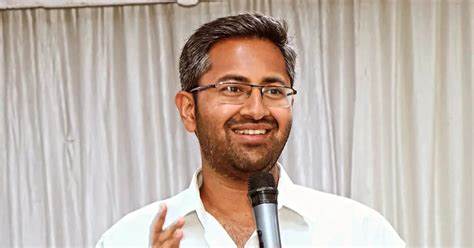TDP MP: "Delimitation Should Not Penalize States with Low Population and High GDP; It Should Be Based on Diverse Factors"
Politics Politics of IndiaPosted by NewAdmin on 2025-03-13 08:47:50 |
Share: Facebook | Twitter | Whatsapp | Linkedin Visits: 99

Amidst the ongoing debateover delimitation, Telugu Desam Party (TDP) MP from Visakhapatnam, SribharatMathukumilli, has called for finding a “middle ground” that accommodates theconcerns of most states. He emphasized that it is premature to oppose the processuntil the details of the delimitation parameters are revealed. Mathukumilli,who is also an educationist and president of GITAM University, shared his viewson the delimitation issue, the National Education Policy (NEP) 2020, and thethree-language policy.
TDP’s Position onDelimitation
Mathukumilli stated that delimitation is a necessary process and should accountfor various factors beyond just population. He acknowledged concerns thatsouthern states, which have been successful in controlling population growth,might lose parliamentary seats. However, he emphasized that these concernsshould be raised at the appropriate time once the details of the delimitationprocess are available. He believes that opposition to delimitation is currentlydriven by fear, not facts. Once the specifics are disclosed, it would be theright time to discuss the matter further, citing how the Waqf Bill was referredto a Joint Committee of Parliament (JCP) when the opposition had reservations.
Diverse DelimitationParameters
Mathukumilli suggested that the concerns of southern states could be addressedthrough a more comprehensive approach, rather than relying solely on populationfigures. He proposed that states contributing disproportionately to the GDP,despite having lower populations, should not be penalized. The delimitationparameters should therefore be more diverse, considering factors such aseconomic contribution alongside population. He stressed the importance ofreaching a middle ground where most states are satisfied, even though not everystakeholder can be fully pleased. However, he noted that it is too early tomake strong objections without knowing the full details of the process.
Government Transparency onDelimitation
Mathukumilli argued that the government has yet to take any significant actionon delimitation, suggesting that people should wait for developments beforeraising complaints. He expressed that if the government announces the processwithout giving adequate time for consideration, it would be fair to protest.
Three-Language Policy andLanguage Diversity
Regarding Tamil Nadu's objections to the three-language policy, Mathukumillirefrained from commenting on Tamil Nadu's specific stance but highlighted thatin Andhra Pradesh and Telangana, people are generally open to learning morelanguages. He noted that many Parliament members from Telugu states arecomfortable speaking in Hindi and expressed hope that he, too, would be able todeliver a speech in Hindi in the future. Mathukumilli emphasized that languageis a vital means of connection, and learning one language does not hinderlearning others.
He also discussed thechallenges facing the education system, stating that the primary concern shouldbe the quality of education and how well languages and subjects are taught. Hedescribed the NEP as progressive and liberal, with the ultimate goal of improvingeducational standards, although he questioned whether it was being implementedfully by both the central and state governments.
State Resistance to NEP
When asked about states like Tamil Nadu, Kerala, and Karnataka opposing theNEP, Mathukumilli pointed out that political differences with the Centre shouldnot lead to depriving students of the benefits the policy offers. He suggestedthat uniformity across the country is essential, particularly in highereducation. He gave the example of Tamil Nadu students being restricted fromrejoining courses without losing credits, a practice outlined in the NEP, whichwould disadvantage them. He argued that the more languages a student learns,the better equipped they are to communicate globally and secure jobopportunities tied to those languages.
Search
Categories
Recent News
- A Son's Burden: Healthcare Woes in Madhya Pradesh
- Hyderabad Tragedy: Tech Industry Stress Claims Another Life
- Gang-Rape and Social Media: A Dark Intersection in Odisha
- Tragic Discovery at Ranchi Construction Site
- AI Assistant's Unpredictable Behavior Raises Concerns
- Andhra Pradesh's Industrial Renaissance: Naidu's Vision for Nellore
- Pakistan's Security Crisis: Rebels Outgun the Military
- The Sun's X8.3 Flare: Unveiling the Power of Solar Storms
Popular News
- Navigating IPO Market Dynamics Amid Volatility and Regulatory Changes
- Massive Worldwide Microsoft Outage Disrupts Multiple Sectors
- Panjapur Bus Stand to Reshape TNSTC Routes
- తెలుగుదేశం పార్టీ - పేదరికాన్ని నిర్మూలించడంలో వాగ్దానం
- Universities Embrace Remote Learning Technologies Amidst Ongoing Pandemic